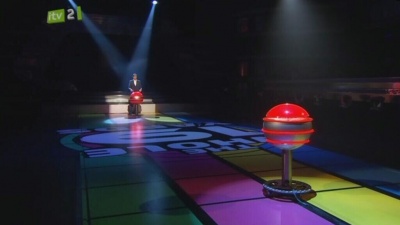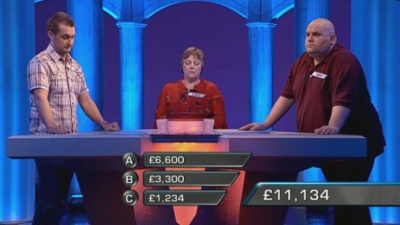Weaver's Week 2010-05-02
Last week | Weaver's Week Index | Next week
Coming up: the latest from Countdown, the game shows nominated for BAFTA craft awards, and we dissect "fair, but not necessarily just". But first, a short distance to travel.
Contents |
The Whole 19 Yards
Endemol for ITV, 7pm Saturday
Saturday night has traditionally been a space for larger-than-life game shows. Gladiators is the archetypal Big Dumb Show, with its mixture of larger-than-life characters (in both senses of the word), former cabinet minister Ulrika Jonsson, and giant cotton-wool buds. It spawned many imitators – Ice Warriors, Simply the Best – none of them as good as the original.
It took many years, and a flawed revival of Gladiators, but eventually the Big Dumb Show did come back. If we're honest, Hole in the Wall was a one-trick pony, and we were bored of it before the end of the first episode. Total Wipeout is also a one-trick pony, but it seems to attract enough viewers to make it worth recommissioning.
ITV's been looking for a Big Dumb Show, and given the channel's heritage, we would expect them to make it slicker, glitzier, bigger, showier, and – yes – dumber than anything the BBC could offer. Who Dares Sings! was slick, glitzy, and superficial, but people needed to use their brains to work out what was going on. The more recent Push the Button was a simple idea, but nothing starring Antan Dec is ever going to be so utterly vapid as to be a Big Dumb Show.
No, what ITV wants is something so simple a child of three could understand it, and a child of three could want to play it. Which brings us to The Whole 19 Yards, a show that has a very simple premise. You start here, there's a button to push 19 yards away, and between you and it is an obstacle. Get from here to the button, push it first, answer the question correctly, and that's a good thing.
The structure of the game is slightly more than that, but not much. Four contestants are brought into the studio, we learn their name, age, location, job, and an amusing fact. Then Vernon Kay (the host for this show) reads out a series of questions – in theory, they're getting easier as he goes on. As soon as a player reckons they know the answer to one of them, they set off through the obstacles. The first player to reach the other end and push their button gets the chance to answer the last question they heard before setting off, and a correct answer means that player qualifies for the next round. An incorrect answer means the next player to push their button is asked the question before they set off, and so on.
Now, with four contestants taking part in the show, one qualifying from each run, and three places in the next round, it doesn't take an Anne Aston to work out that there will be (er, one and one and one is, er) three runs on the first round. This means that we're going to see the same game played three times, just with fewer contestants each time. Sometimes, just to be a little sneaky, the producers will make an added difficulty on the second and third runs. Sometimes they won't. Similarly, the second round is going to be played twice, and the third just once.
None of this would be a problem if the challenges themselves bore repetition. The trouble is, not all of them particularly bear seeing twice, never mind more often. The second show invited its contestants to crawl through a tunnel of balloons. And, er, that's it. Seeing the same obstacles over and over again is what they do on Total Wipeout, and it makes that show a bit tedious. The same thing happens on The Whole 19 Yards, though at least they get through each round in about ten minutes.
Even after just two episodes, we're getting awfully familiar with the apparatus used on the show. Round one begins with a climb up, there's a gap in the middle, and the buzzers are also raised off the ground. Round two has a couple of intervening walls, with little holes in them. Round three, mercifully, has something different, whether it's mobile batteries, or keys hidden in plastic domes.
Whoever wins the third round goes through to the final, where the rules change. They'll face five questions, for increasing amounts of money – 5, 10, 20, 50 grand, and a top prize of £100,000. Each question consists of a number of clues, a bit like a Going for Gold final round question read out by a Henry Kelly robot whose batteries need changing – there's a prolonged pause between each statement. When the contender knows the answer, they must press the buzzer and answer.
The catch? The buzzer is on a motorised platform, and it's moving down the titular 19 yards. Vernon Kay is progressing down the track with it. As the questions continue, the contestant must run further and further down the track to push the buzzer. There is double jeopardy – if the buzzer reaches the end of the 19 yards, the contender will leave with nothing. And if the contestant pushes the button and gives an incorrect answer, they'll drop down a level on the prize tree, and their game will end. Yes, the contender doesn't have to play any question, and can quit at any time.
Is this brainwork consistent with a Big Dumb Show? We're not entirely sure it is, but The Whole 19 Yards has another problem: the picture quality. There's often too much happening for the system to cope with, with camera swings and things moving on screen all combining to overload the digital encoder whotsits. The picture smears and blurs all too often – the balloon game in week two was clearly trying to squeeze two pints of picture into one pint of transmission, and looked shockingly bad at times.
It's certain that The Whole 19 Yards (unlike, say, Eggheads) benefits from being shot in high-definition, and we will assume that this isn't noticeable for viewers watching ITV high-def, but that's hardly the point. Most viewers – something like 98% of the audience – will be watching on standard definition sets, and they would be best served by retuning to analogue, if they still can.
Vernon and the contestants aren't alone in the studio. Caroline Flack has a small part to play, a second body on the studio floor. Glenn Hugill (The Mole's host, harrumph, Gameshow General Election ballot) provides a voiceover with some scripted but very well-delivered lines.
But let's not end on a down note. The Whole 19 Yards tries to be fun, and everyone involved tries to make it fun. We haven't tremendously enjoyed the shows we've seen so far, but nor would we turn the show off if we caught it at a later date.
Fair, But Not Necessarily Just
Back at the beginning of February, there was an interesting discussion on Bother's Bar. The entirely agreeable proprietor contributed to a thread about In It to Win It with the note that someone was confusing "fair" with "just". Mr. Gizensha added an anecdote about Quest for the Golden Carrot, where the winner is the person holding the one true golden carrot, and Mr. Dickson asked directly, "does this reflect an increased preference over the past fifteen or so years in society for fairness over justice?"
Now that we've got a little space in the Week, we might be able to analyse the question. Our starting point is our standard contention that game shows reflect society, rather than create it. We also need to define terms – for this discussion, we treat "fair" as being "free from bias", and "just" as "morally equitable to all participants".
The initial question is whether game shows are capable of being both fair and just. Let's take The Whole 19 Yards as a handy example. We've no doubt that Endemol has picked its contestants and arranged them on the show; they'll have chosen two men and two women for each broadcast, they'll have picked a reasonable representation of ages, geographical balance, and so on, and so on.
Now, this isn't necessarily fair – if you're a young sporty man, and lots of young sporty men have applied, you're less likely to get on than if you're a glamorous granny, sprightly and over 50. Endemol has reasons for its action – the producers believe that there's a better television programme if there's a mixture of ages and sexes, there's more opportunity for the host to banter, and for the viewer to find someone they can root for or against. Does the improvement in the quality of the show outweigh the unfairness in selecting contestants? That's a decision each individual viewer will have to make. For what it's worth, this column is of the opinion that it does, and while not necessarily fair, it is just.
So, we have our contestants, and we've got some challenges for them to do. Some of them will find particular tasks easier than other contestants. The fair way to do things is for one part of the production staff to select contestants, for another part to arrange the games for each programme, and for there to be no crossover between the two parts until it's almost time to record the show. Two little teams, working with a wall between them, ensures fairness, and ensures justice.
All of this is fairly simple stuff. We've no doubt that Endemol meets these standards, and conducts its whole operation in a fair fashion. Readers may recall the debacle of 0898gate, the seemingly endless procession of television and radio competitions conducted in a slipshod and haphazard manner. These were offensive to the public precisely because they weren't fair, and nor was the outcome just. Inventing winners is clearly unfair to people who have entered the competition in good faith, and deceiving one's viewers in such a fundamental way is morally wrong.
More generally, is it just (as in, morally equitable) to construct a game show that isn't fair (free from bias)? This is a more difficult question, and this column must hedge its bets slightly. Our view is this: if the rules are known to all participants beforehand, and if the operation of the game is conducted precisely within those rules, then we have somewhat fewer qualms. We won't wave through an unfair format, but nor will we object tremendously loudly if it's just in its application of unfair rules.
The whole discussion arose out of an episode of In It to Win It where some contestants weren't selected to answer a single question. This show selects its players by random draw from those available, and thus will privilege some contestants over others. However, these rules are known to everyone from the outset, and they are rigorously followed. In It to Win It may not have the moral certainty to make it a just programme, but it is a fair one.
To take another example, Divided. The rules of the endgame are very simple – the producers have chosen how the jackpot will be split, into three unequal parts. This is blatantly not just – the morally equitable solution would be to allow the team to decide upon their own split, stopping as soon as they claimed no more than 100% of the available prize. However, once the split is made, the panel must agree amongst themselves who will take each part, and those parts will reduce as time passes. This part proceeds according to the rules laid out, and hence meets our criterion for fairness.
Why does Divided leave a sour taste in many people's mouths? Perhaps it's because this not-just situation is imposed from without, a deus ex machina that may (or may not) make for better television. The viewer is accustomed to accepting a little artifice in pursuit of art; they may be less comfortable with an artificial situation that is manifestly not fair.
We've gone on for a few paragraphs now without addressing the elephant in the room. Morality is a personal choice, one person's virtue is someone else's vice. The textbook example is Mary Whitehouse, who spent thirty years campaigning against what she saw as "filth" and "depravity" on the television. She believed that her actions were consistent with her moral view. Some other people were deeply offended by the way she tried to bend society to fit her views.
Mrs. Whitehouse's campaigns led (very indirectly) to the current broadcasting regulator OFCOM, and its long code on how much sex and violence one can have on television. When it comes to regulation, a happy medium has to be struck: some people will complain that the rules are too tight, others that they're too strict. We think the right point is for regulation to be slightly but noticeably less permissive than the median person, so that the total level of outrage from people annoyed on each side will be roughly equal – it's a fact of life that offended reactionaries tend to shout louder and longer than offended liberals.
One could ask whether OFCOM reaches decisions that are fair and just. This week's Broadcast Bulletin contained many items of interest. Complaints against shoddily-administered competitions on radio stations were upheld – not only were they breaking the OFCOM rules (unfair) but they were not treating listeners equitably (unjust).
The regulator declined to uphold complaints against Sky News's ice maiden Kay Burley, who had posed sensitive personal questions to tabloid celebrity Peter Andre about his ex-wife, his weight, and the custody of his children. OFCOM found that the broadcast was compliant with the letter of its code, but it's clear that many people believe his treatment was unjust.
There are many previous examples of programmes causing disquiet amongst the viewers, yet OFCOM will only act if there's a clear breach of its rules. It forces broadcasters to stick to the letter of the law, while allowing them to ride roughshod over the spirit of the law. The creeping nationalisation of ITV is a case in point – the regulator has been persuaded that Granada and Carlton had a right to unlimited profits, and that the vestigial local programmes can be discarded in the dash for cash.
OFCOM itself is a government creation. The present regulator was born out of two bodies – one regulating sex and violence, the other regulating what the independent television companies could and could not do. In turn, these bodies were created out of the Independent Broadcasting Authority, which conducted both of these functions and others. OFCOM has chosen, quite possibly with support from the government, to regulate in this manner – applying the letter of the law to complaints over one use of the f-word before nightfall, while ignoring commitments to local shows. The result is "public service" broadcasting that doesn't actually serve the public. OFCOM is fair in the rules it upholds, but the choice of rules is manifestly unjust.
This is only one example of how the win-at-all-costs mentality has become a common thread through society over the past couple of decades. It's no surprise to find it reflected in the game shows we see. That said, we don't recall a successful game show to actively encourage cheating and blatant deception – Liar (2002) and Traitor (2004) were one-run wonders on BBC2, and the only thing people remember about Shafted (2001) has nothing to do with its gameplay. On the fringes of game shows are the likes of Late Night Poker (1999 – present) and its descendants, where misrepresentation is not only legal but actively encouraged. These shows are fair, but this column has the greatest difficulty in saying that they're just.
A game show requires a clear set of rules, otherwise it breaks down into anarchy, and anarchy tends to make viewers feel unsafe, and hence isn't good television. We don't rule out the possibility of a successful freeform game show, but such a format would be difficult to perfect.
Countdown Update
From the sublime to the quotidian, and it's time to look again at YTV's greatest game show. When we last wrote in March, we left Kevin Davis stuck on five wins – he didn't add to his total (516 points) before losing to Dave Wilkinson. He was the first of four contenders who looked likely to make octochamp status, but fell agonisingly short – Dave won seven shows, and accumulated 647 points, before falling to Barry Watson (2 wins, 288).
Peter Zyss took over the champion's chair on Good Friday, the first of 7 wins (617 points). Claudia Tyson denied him octochamp status, and very nearly achieved it herself (6 wins, 545). Chris Jones defeated her in a low-scoring game (1 win, 123), before losing to Nikki Sellars. Again, she's fallen just shy, with 6 wins (556). The new champion is Lee Graham, who has just this win under his belt.
Though there hasn't been an octochamp since there was snow on the ground, the qualification for Finals Week is as tough as ever. Here are the current seeds, with about 33 heats to play:
| Oliver Garner | 8 wins | 802 pts |
| Dave Wilkinson | 7 | 647 |
| Peter Zyss | 7 | 617 |
| Craig Chittenden | 6 | 662 |
| Nikki Sellars | 6 | 556 |
| Claudia Tyson | 6 | 545 |
| Kevin Davis | 5 | 516 |
| Raheel Mirza | 5 | 506 |
This Week And Next
Nominations were announced for the BAFTA Craft awards. A new category caught our eye, "Entertainment Production Team", for which the nominees are The Apprentice, Britain's Got Talent, The X Factor, and Top Gear. One more gamey nominee: Robert Marsh, Oliver Davies, Simon Brickle for "The Apprentice: Predictor" in the Interactive Creative category.
Ratings for the week to 18 April show that Britain's Got Talent was the most popular show on the box, 11.85m people tuned in expecting to be entertained. Bad luck, everyone. Next biggest game show was Thursday's HIGNFY at just under 5m viewers, closely followed by Over the Rainbow. The Whole 19 Yards debuted with 4.5m, ahead of Who Dares Wins (4.2m). Sunday night's Come Dine With Me secured 3.05m pairs of eyeballs, and BBC2's biggest shows were part-networked editions of Mastermind and QI.
On the digital channels, Britain's Got Talent holds down the top two places like a sopping fun sponge, 1.43m people saw Even More Talentless Auditions on Saturday night. Come Dine With Me had 940,000, and the Only Connect final (350,000) slotted between Total Wipeout on CBBC (305,000) and Four Weddings (460,000).
The bank holiday is marked by marathons of popular series – Have I Got News for You (Sun) on Dave, Celeb Millionaire (Mon) on Challenge, and Total Wipeout US on Watch (Mon). Virgin 1 finally brings World's Strongest Man to free television (6pm Sun), and Watch unleashes puke-quizzing on Scream If You Know the Answer! (7pm Sun). CBBC is effortlessly cool with Mission 2110 (5.45 Mo-We). It's the final week of campaigning in the Gameshow General Election, and Richard Bacon explains the voting system on Fighting Talk (12 noon Mon). Ratings Bear pulls the lever and declares the Gameshow General Election 2010 closed at 10pm next Thursday, and reaction on all channels includes some themed game shows on Channel 4 (from, er, 9pm).
To have Weaver's Week emailed to you on publication day, receive our exclusive TV roundup of the game shows in the week ahead, and chat to other ukgameshows.com readers, sign up to our Yahoo! Group.








